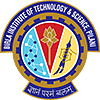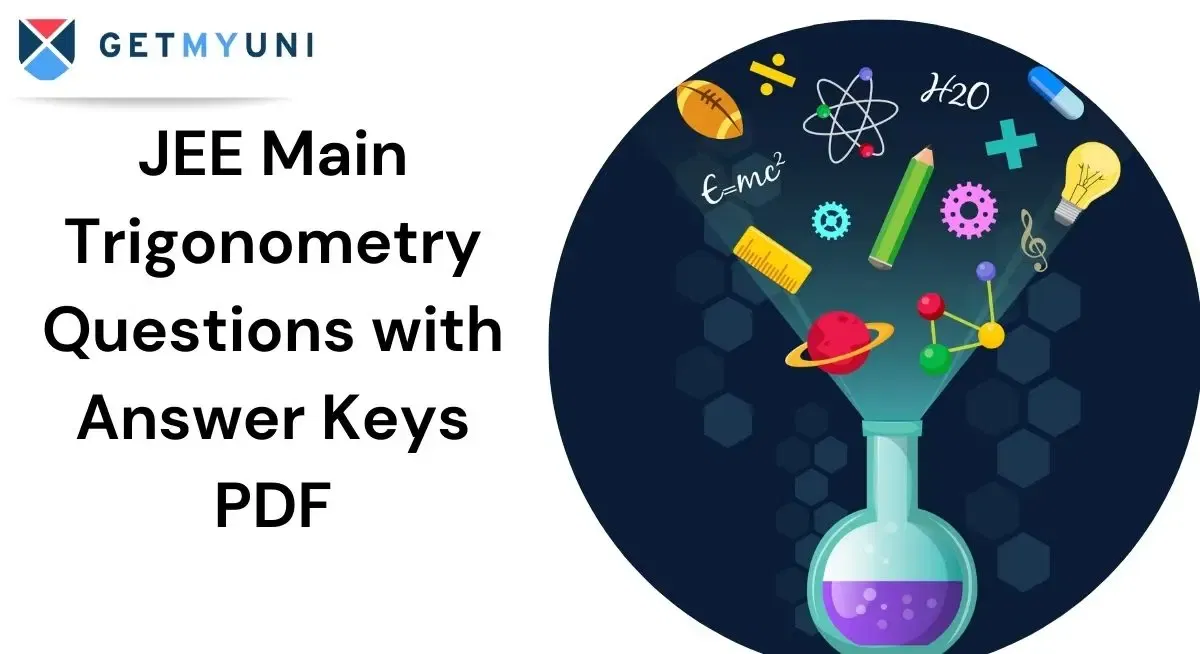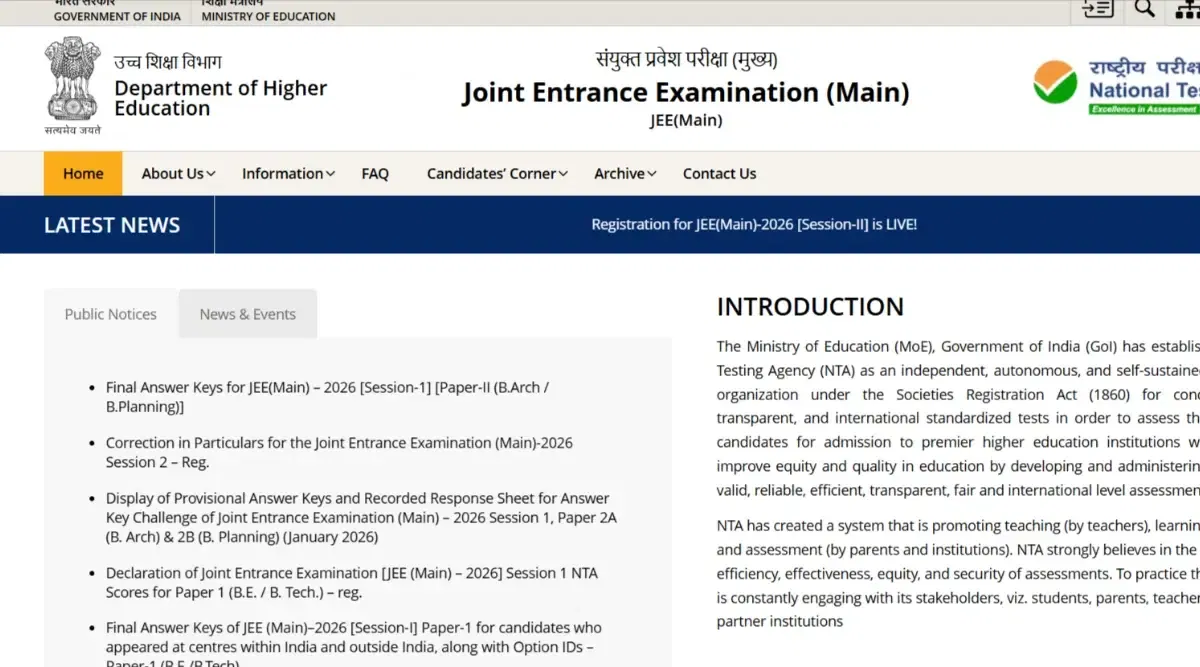
Table of Contents
- JEE Main Chemistry Syllabus 2025
- Physical Chemistry JEE Main Syllabus 2025
- Inorganic Chemistry JEE Main Syllabus 2025
- Organic Chemistry JEE Main Syllabus 2025
- JEE Main Chemistry Syllabus with Weightage (Topic-wise/ Chapter-wise)
- Important Topics for JEE Main Chemistry 2025
- Most Important Chapters for JEE Main Chemistry 2025
- Books Recommended for JEE Main Chemistry Syllabus 2025
- JEE Main Chemistry Syllabus Preparation Tips
JEE Main Chemistry syllabus 2025 covers topics from inorganic, organic, and physical chemistry. The JEE Main 2025 syllabus is released by NTA through its official website.
Candidates must check the JEE Main Chemistry syllabus along with the essential topics, books, and preparation tips to score good marks. Moreover, a detailed overview of the important topics and chapter-wise weightage will allow students to strategize their preparation schedule based on their areas of weaknesses.
JEE Main Chemistry Syllabus 2025
Chemistry is considered a scoring subject for JEE Main. The JEE Main Chemistry syllabus 2025 is quite vast and is considered tough, candidates need to be precise and thorough with each topic in order to score good marks. Further, the syllabus is divided into three parts:
- Physical Chemistry
- Inorganic Chemistry
- Organic Chemistry
| JEE Main Chemistry Syllabus PDF 2025 | Download PDF |
Physical Chemistry JEE Main Syllabus 2025
Shown below are the Physical Chemistry in the JEE Main syllabus for Physical Chemistry. Each topic and covering sub-topics are elaborately mentioned:
Some Basic Concepts of Chemistry
- Matter and its nature
- Dalton's atomic theory
- Physical quantities and measurements
- Laws of chemical combination
- Atomic and molecular masses
- Mole concept and stoichiometry
States of Matter
- Classification of matter
- Gaseous State
- Liquid State
- Solid State
Atomic Structure
- Atomic models (Thomson, Rutherford)
- Electromagnetic radiation
- Bohr model
- Quantum mechanics
- Quantum numbers and orbitals
Chemical Bonding and Molecular Structure
- Ionic and covalent bonds
- Valence Shell Electron Pair Repulsion (VSEPR)
- Valence bond theory
- Molecular Orbital Theory
- Hydrogen bonding
Solutions
- Concentration of solutions
- Raoult's Law
- Colligative properties
- Molecular mass determination
Equilibrium
- Equilibria involving physical processes
- Equilibria involving chemical processes
- Ionic equilibrium
- Le Chatelier's principle
Redox Reaction and Electrochemistry
- Redox reactions
- Electrolytic and Galvanic cells
- Electrode potentials
- Nernst equation
Chemical Kinetics
- Rate of chemical reactions
- Rate laws and factors affecting reactions
Surface Chemistry
- Adsorption- Physisorption and chemisorption and their characteristics, factors affecting adsorption of gases on solids - Freundlich and Langmuir adsorption isotherms, adsorption from Solutions.
- Catalysis - Homogeneous and heterogeneous, activity and selectivity of solid catalysts, enzyme catalysis and its mechanism.
- Colloidal state- distinction among true solutions, colloids and suspensions, classification of colloids - lyophilic. lyophobic; multimolecular, macromolecular and associated colloids (micelles), preparation and properties of colloids - Tyndall effect. Brownian movement, electrophoresis, dialysis, coagulation and flocculation: Emulsions and their characteristics.
Inorganic Chemistry JEE Main Syllabus 2025
Inorganic chemistry JEE Main syllabus carries the following topics and sub-topics:
Classification of Elements and Periodicity in Properties
- Modern periodic law and present form of the periodic table. s, p, d and f block elements.
- Periodic trends in properties of elements atomic and ionic radii, ionization enthalpy.
- Electrons gain enthalpy, valence, oxidation states and chemical reactivity.
General Principles and Process of Isolation of Metals
- Modes of occurrence of elements in nature, minerals, ores.
- Extraction of metals: concentration, reduction (chemical and electrolytic methods) and refining with special reference to the extraction of Al, Cu, Zn, and Fe.
- Thermodynamic and electrochemical principles involved in the extraction of metals.
Hydrogen
- The position of hydrogen in the periodic table, isotopes, preparation, properties, and uses of hydrogen.
- Physical and chemical properties of water and heavy water.
- Structure, preparation, reactions, and uses of hydrogen peroxide.
- Classification of hydrides: ionic, covalent and interstitial. Hydrogen as a fuel.
S Block Elements (Alkali and Alkaline Earth Metals) - Group 1 and Group 2 Elements
- General introduction, electronic configuration and general trends in physical and chemical properties of elements, anomalous properties of the first element of each group, diagonal relationships.
- Preparation and properties of some important compounds: sodium carbonate, sodium chloride, sodium hydroxide and sodium hydrogen carbonate.
- Industrial uses of lime, limestone, Plaster of Paris and cement.
- The biological significance of Na, K, Mg and Ca.
P- Block Elements - Group 13 to Group 18 Elements
- General Introduction, Electronic configuration, and general trends in physical and chemical properties of elements across the periods and down the groups; unique behaviour of the first element in each group. Groupwise study of the p-block elements.
- Group 13: Preparation, properties, and uses of boron and aluminium; Structure, properties and uses of borax, boric acid, diborane, boron trifluoride, aluminium chloride, and alums.
- Group 14: Tendency for catenation; Structure, properties, and uses of allotropes and oxides of carbon, silicon tetrachloride, silicates, zeolites, and silicones.
- Group 15: Properties and uses of nitrogen and phosphorus; Allotropic forms of phosphorus; Preparation, properties, structure, and uses of ammonia, nitric acid, phosphine and phosphorus halides, (PCl3, PCl5); Structures of oxides and oxoacids of nitrogen and phosphorus.
- Group 16: Preparation, properties, structures and uses of dioxygen and ozone; Allotropic forms of sulfur; Preparation, properties, structures, and uses of sulfur dioxide, sulphuric acid (including its industrial preparation); Structures of oxoacids of sulfur.
- Group 17: Preparation, properties, and uses of chlorine and hydrochloric acid; Trends in the acidic nature of hydrogen halides; Structures of Interhalogen compounds and oxides and oxyacids of halogens.
- Group 18: Occurrence and uses of noble gases; Structures of fluorides and oxides of xenon.
D and F Block Elements
- Transition Elements: General introduction, electronic configuration, occurrence and characteristics, general trends in properties of the first-row transition elements: physical properties, ionization enthalpy, oxidation states, atomic radii, colour, catalytic behaviour, magnetic properties, complex formation, interstitial compounds, alloy formation.
- Preparation, properties, and uses of K2Cr2O7 and KMnO4.
- Inner Transition Elements: Lanthanides, Electronic configuration, oxidation states, chemical reactivity and lanthanide contraction
- Actinoids: Electronic configuration and oxidation states.
Coordination Compounds
- Introduction to coordination compounds, Werner’s theory, ligands, coordination number, denticity, chelation. IUPAC nomenclature of mononuclear coordination compounds, isomerism. Bonding-Valence bond approach and basic ideas of Crystal field theory, colour and magnetic properties. Importance of coordination compounds (in qualitative analysis, extraction of metals and biological systems).
Environmental Chemistry
- Environmental pollution: Atmospheric, water, and soil.
- Atmospheric pollution: Tropospheric and stratospheric.
- Gaseous pollutants: Oxides of carbon, nitrogen, sulfur, hydrocarbons; their sources, harmful effects, and prevention. Greenhouse effect and Global warming, acid rain.
- Particulate pollutants: Smoke, dust, smog, fumes, mist; their sources, harmful effects, and prevention.
- Stratospheric pollution: Formation and breakdown of ozone, depletion of the ozone layer, its mechanism and effects.
- Water Pollution: Major pollutants such as pathogens, organic wastes, and chemical pollutants; their harmful effects and prevention.
- Soil pollution: Major pollutants such as Pesticides (insecticides, herbicides and fungicides) their harmful effects and prevention. Strategies to control environmental pollution.
Organic Chemistry JEE Main Syllabus 2025
The organic chemistry syllabus is mentioned below, this section is considered important as many questions come in the exam from this part.
Purification and Characterisation of Organic Compounds
- Purification: Crystallization, differential extraction, sublimation, distillation and chromatography principles and their applications.
- Qualitative analysis: Detection of halogens, phosphorus, nitrogen and sulfur.
- Quantitative analysis: Estimation of carbon, halogens, sulfur, hydrogen, nitrogen and phosphorus. Calculations of empirical formula and molecular formulae, Numerical problems in organic quantitative analysis.
Some Basic Principles of Organic Chemistry
- Tetravalency of carbon; Shapes of simple molecules – hybridization (s and p).
- Classification of organic compounds based on functional groups: -C = C- and those containing halogens, oxygen, nitrogen, and sulfur; Homologous series.
- Isomerism: structural and stereoisomerism.
- Nomenclature (Trivial and IUPAC): Covalent bond fission Hemolytic and heterolytic: free radicals, carbocations, and carbanions; stability of carbocations and free radicals, electrophiles and nucleophiles.
- Electronic displacement in a covalent bond: Inductive effect, electrometric effect, resonance, and hyperconjugation.
- Common types of organic reactions: Substitution, addition, elimination, and rearrangement.
Hydrocarbons
- Classification, isomerism, IUPAC nomenclature, general methods of preparation, properties and reactions.
- Alkanes: Conformations; Sawhorse and Newman projections (of ethane); Mechanism of halogenation of alkanes.
- Alkenes: Geometrical isomerism.
- Mechanism of electrophilic addition: addition of hydrogen, halogens, water, hydrogen halides (Markownikoff’s and peroxide effect); Ozonolysis, oxidation, and polymerization.
- Alkynes: Acidic character; Addition of hydrogen, halogens, water and hydrogen halides; Polymerization.
- Aromatic hydrocarbons: Nomenclature, benzene structure and aromaticity.
- Mechanism of electrophilic substitution: halogenation, nitration, Friedel Crafts alkylation and acylation, directive influence of the functional group in monosubstituted benzene.
Organic Compounds Containing Halogens
- General methods of preparation, properties, and reactions. Nature of C – X bond. Mechanisms of substitution reactions. Uses, Environmental effects of chloroform, iodoform, freons, and DDT.
Organic Compounds Containing Oxygen
- General methods of preparation, properties, reactions, and uses.
- Alcohols, Phenols and Ethers
- Alcohols: Identification of primary, secondary and tertiary alcohols; mechanism of dehydration.
- Phenols: Acidic nature, electrophilic substitution reactions: halogenation, nitration, and sulphonation, Reimer Tiemann reaction.
- Ethers: Structure
- Aldehyde and Ketones: Nature of carbonyl group; Nucleophilic addition to >C=O group, relative reactivities of aldehydes and ketones. Important reactions such as Nucleophilic addition reactions (addition of HCN, NH3 and its derivatives), Grignard reagent; oxidation; reduction (Wolff Kishner and Clemmensen); the acidity of hydrogen, aldol condensation, Cannizzaro reaction, Haloform reaction. Chemical tests to distinguish between aldehydes and Ketones.
- Carboxylic Acids: Acidic strength and factors affecting it.
Polymers
- General introduction and classification of polymers, general methods of polymerization addition and condensation, co-polymerization.
- Natural and synthetic rubber and vulcanization.
- Some important polymers with emphasis on their monomers and uses, polyethene, nylon, polyester, and bakelite.
Biomolecules
- General introduction and importance of biomolecules.
- Carbohydrates: Classification: aldoses and ketoses; monosaccharides (glucose and fructose), constituent monosaccharides or oligosaccharides (sucrose, lactose, maltose) and polysaccharides (starch, cellulose, glycogen).
- Proteins: Elementary Idea of amino acids, peptide bond, polypeptides; Proteins: primary, secondary, tertiary and quaternary structure (qualitative idea only), denaturation of proteins, enzymes.
- Vitamins: Classification and functions.
- Nucleic Acids: The chemical constitution of DNA and RNA. Biological functions of nucleic acid.
Chemistry in Everyday Life
- Chemicals in medicines: Analgesics, tranquilisers, antiseptics, disinfectants, antimicrobials, antifertility drugs, antibiotics, antacids, antihistamines, their meaning and common examples.
- Chemicals in food: Preservatives, and artificial sweetening agents are common examples.
- Cleansing agents: Soaps and detergents, cleansing action.
Principles Related to Practical Chemistry
- Detection of extra elements (N, S, halogens) in organic compounds.
- Detection of the following functional groups: carbonyl (aldehyde and ketone), hydroxyl (alcoholic and phenolic), carboxyl and amino groups in organic compounds.
- Inorganic compounds: Mohr’s salt, potash alum, and Organic compounds: Acetanilide, p-nitro acetanilide, aniline yellow, iodoform.
- Titrimetric exercises: Acids bases and the use of indicators, oxalic acid vs KMnO4, Mohr’s salt vs KMnO4.
- Qualitative salt analysis – Cations: Pb2+, Cu2+, AI3+, Fe3+, Zn2+, Ni2+, Ca2+, Ba2+, Mg2+, NH4+, and Anions: CO32-, S2-, SO42-, NO2-, NO3-, CI-, Br, I (Insoluble salts excluded).
- Enthalpy of solution of CuSO4,
- Enthalpy of neutralization of strong acid and strong base
- Preparation of lyophilic and lyophobic sols,
- Kinetic study of the reaction of iodide ion with hydrogen peroxide at room temperature.
JEE Main Chemistry Syllabus with Weightage (Topic-wise/ Chapter-wise)
Now that students know the entire JEE Main Chemistry syllabus 2025, let us look at the topic-wise weightage. The table shows the marks and question division for each topic. It will further help in understanding the marking and enhance the exam preparation.
| Total Questions | Topics | Weightage |
|---|---|---|
| 1 | Chemical Kinetics | 4 |
| 1 | Atomic Structure | 4 |
| 1 | Alkyl Halides | 4 |
| 1 | Solid State And Surface Chemistry | 4 |
| 1 | Redox Reaction | 4 |
| 1 | Electrochemistry | 4 |
| 1 | General Organic Chemistry | 4 |
| 1 | Stereochemistry | 4 |
| 1 | Hydrocarbon | 4 |
| 1 | Carboxylic Acid and their Derivatives | 4 |
| 1 | Carbohydrates, amino acids and Polymers | 4 |
| 1 | Aromatic Compounds | 4 |
| 2 | Chemical Bonding | 8 |
| 2 | Nuclear Chemistry And Environment | 8 |
| 2 | Periodic table and Representative Elements | 8 |
| 2 | Thermodynamics and Gaseous State | 8 |
| 2 | Chemical And Ionic Equilibrium | 8 |
| 3 | Transition Elements and Coordination Chemistry | 12 |
Important Topics for JEE Main Chemistry 2025
The JEE Mains Chemistry syllabus 2025 is vast. After analyzing the syllabus and question pattern of past years the chapter-wise mark weightage is mentioned above. Candidates can check the most important chapters for JEE Main Chemistry:
Organic Chemistry Important Topics for JEE Main 2025
Questions from this part are not fixed or the same every year, there are random questions from each section. However, mentioned below are certain important topics from which questions can be asked:
- Reactions and their mechanism
- Acidity
- Nomenclature
- Basicity
Inorganic Chemistry Important Topics for JEE Main 2025
In inorganic chemistry, all the topics are considered important and equal carry weightage. Hence knowing the topics is quite an important factor. Listed below are some of the topics:
- Methods of Preparation and Chemical Reactions, uses, etc. of the compounds.
- Chemical bonding
- Elements of the Periodic Table
- Transition elements and coordination chemistry
- S & P block elements and Hydrogen
- Dipole Moment
- Shape and Hybridisation
- Molecular Orbital Theory
- Fajan’s Rule & its Application
Physical Chemistry Topics for JEE Main 2025
Many questions are asked in this Physical Chemistry. Some of the important topics from physical chemistry for JEE Main are the wavelength of electronic transition, quantum numbers and ionisation energy, the rest of them are mentioned below:
- Mole concept
- Redox Reaction
- Formulas and basic concepts of Atomic Structure
- Equilibrium
- Chemical Thermodynamics
- Chemical Kinetics
- Electrochemistry & Redox Reactions
- Surface Chemistry
- Chemical Bonding and Molecular Structure
- Solutions
Most Important Chapters for JEE Main Chemistry 2025
The detailed syllabus is mentioned in the earlier sections, here is a table that reflects the topics from the individual sections that are considered important:
Organic Chemistry
- Purification and characterization of organic compounds
- Hydrocarbons
- Chemistry in everyday life
- Principles related to practical chemistry
- Organic compounds containing
- Halogens
- Oxygen
- Nitrogen
- Polymers
- Biomolecules
- Some basic principles of organic chemistry
Inorganic Chemistry
- Classification of elements and periodicity in properties
- Hydrogen
- Block elements (alkali and alkaline earth metals)
- P Block elements group 13 to group 18 elements
- d- and f – block elements
- Coordination compounds
- Environmental chemistry
- General principles and processes of isolation of metals.
Physical Chemistry
- Some Basic Concepts in Chemistry
- Atomic Structure
- State of Matter
- Chemical Bonding and Molecular Structure
- Chemical Thermodynamics
- Solutions
- Equilibrium
- Redox, Reaction and Electrochemistry
- Chemical Kinetics
- Surface Chemistry.
Books Recommended for JEE Main Chemistry Syllabus 2025
Here is the list of books that are recommended for JEE Main exams chemistry that can help you derive the desired marks:
| Section | Books | Author/Publisher |
|---|---|---|
| Common Syllabus | Class 11-12 Chemistry book | NCERT |
| Organic Chemistry | Advanced Problems in Organic Chemistry for JEE | M S Chauhan |
| A Guidebook to Mechanism in Organic Chemistry for the JEE | Peter Sykes | |
| Inorganic Chemistry | Concise Inorganic Chemistry | J.D. Lee |
| Problems in Inorganic Chemistry for JEE Main & Advanced | V. K. JAISWAL | |
| Physical Chemistry | Problems in Physical Chemistry | Narendra Awasthi |
| Atkins’ Physical Chemistry |
JEE Main Chemistry Syllabus Preparation Tips
JEE Main Chemistry syllabus is considered quite significant in increasing the total aggregate marks. Most of the questions are based on fundamental concepts.
The questions are less time-consuming as they are not calculation-based. Listed below are a few tips that can enhance your chances of getting the qualifying rank:
- Candidates are required to be thorough with all the important formulas, named reactions, chemical equations, and periodic table trends.
- Clarity about the JEE Main Chemistry syllabus 2025 is quite an important factor for scoring higher marks.
- Refer to proper study materials and books.
- Read the question paper carefully before jumping to answer, if there is any doubt, take a little time to understand and then attempt the question.
- There must be knowledge of every topic and what logic works behind a particular concept.
FAQs on JEE Main Chemistry
Q: Is the JEE Main 2025 syllabus PDF released?
Q: Which IIT will set the JEE Main 2025 exam paper?
Q: What is the JEE Main 2025 chemistry syllabus?
Q: How many chapters are the JEE Main 2025 chemistry syllabus?
Q: Is NCERT enough for JEE chemistry?






























